Synopsis
Sofia Petrovna, a typist in the Soviet Union in 1937 is proud of the achievements of her son Nikolai (Kolya). Kolya, an engineering student and strong Communist, is at the beginning of a promising career, with his picture featured on the cover of Pravda . Before long, however, the Great Purge begins and Sofia's coworkers begin vanishing, amid accusations of treachery. Soon, Kolya's best friend Alik reports that Kolya has been arrested. Sofia and her friend and fellow typist Natasha try to find out more but are drowned in a sea of bureaucrats and long lines. More people vanish, and Sofia spends ever more time in lines at government buildings. Natasha makes a typographical error that is mistaken for a criticism of the Red Army and she is fired. When Sofia defends her, she is criticized and soon forced out as well. Alik is questioned, and when he does not renounce Kolya, he, too, is arrested and vanishes. Natasha and Sofia both lose their will to live. Natasha commits suicide via poison, and Sofia immerses herself in a fantasy of Kolya's return. When she finally gets a letter from Kolya, in which he reaffirms his innocence and tells more of his own story, Sofia tries to fight for his freedom again, but realizes that, in this bizarre, chaotic place, she will likely only place more suspicion on herself and Kolya. Out of desperation, she burns the letter.
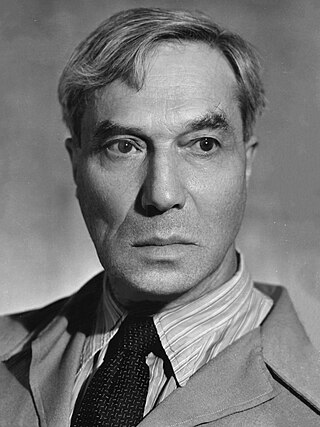
Boris Leonidovich Pasternak was a Russian poet, novelist, composer, and literary translator.

Anna Andreyevna Gorenko, better known by the pen name Anna Akhmatova, was a Russian poet, one of the most significant of the 20th century. She reappeared as a voice of Russian poetry during World War II. She was shortlisted for the Nobel Prize in 1965 and received the second-most (three) nominations for the award the following year.
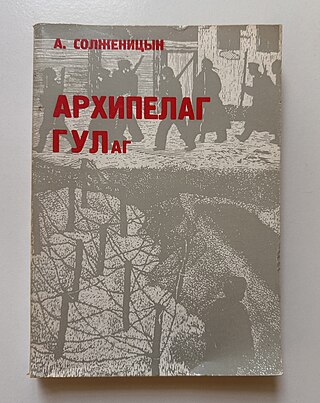
The Gulag Archipelago: An Experiment in Literary Investigation is a three-volume non-fiction series written between 1958 and 1968 by Russian writer Aleksandr Solzhenitsyn, a Soviet dissident. It was first published in 1973 by the Parisian publisher YMCA-Press, and it was translated into English and French the following year. It explores a vision of life in what is often known as the Gulag, the Soviet labour camp system. Solzhenitsyn constructed his highly detailed narrative from various sources including reports, interviews, statements, diaries, legal documents, and his own experience as a Gulag prisoner.

Mikhail Aleksandrovich Sholokhov was a Russian novelist and winner of the 1965 Nobel Prize in Literature. He is known for writing about life and fate of Don Cossacks during the Russian Revolution, the civil war and the period of collectivization, primarily in his most famous novel, And Quiet Flows the Don.
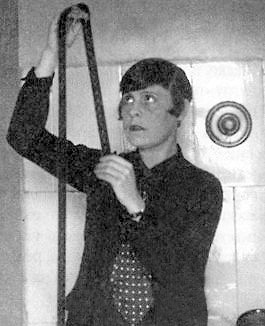
Lilya Yuryevna Brik was a Russian author and socialite, connected to many leading figures in the Russian avant-garde between 1914 and 1930 She was the lover and muse of Vladimir Mayakovsky, even while she was married to poet, editor and literary critic Osip Brik (1888–1945). Pablo Neruda called Lilya the "muse of Russian avant-garde". Her name was frequently abbreviated by her contemporaries as "Л.Ю." or "Л.Ю.Б." which are the first letters of the Russian word "любовь" lyubov, "love".
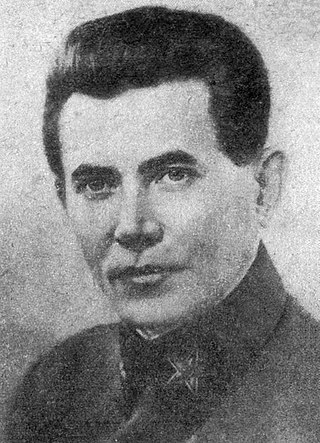
Nikolai Ivanovich Yezhov was a Soviet secret police official under Joseph Stalin who was head of the NKVD from 1936 to 1938, during the height of the Great Purge. Yezhov organized mass arrests, torture and executions during the Great Purge, but he fell from Stalin's favour and was arrested, subsequently admitting in a confession to a range of anti-Soviet activity including "unfounded arrests" during the Purge. He was executed in 1940 along with others who were blamed for the Purge.

Vasily Semyonovich Grossman was a Soviet writer and journalist. Born to a Jewish family in Ukraine, then part of the Russian Empire, Grossman trained as a chemical engineer at Moscow State University, earning the nickname Vasya-khimik because of his diligence as a student. Upon graduation, he took a job in Stalino in the Donets Basin. In the 1930s he changed careers and began writing full-time, publishing a number of short stories and several novels.

Life and Fate is a novel by Vasily Grossman. Written in the Soviet Union in 1959, it narrates the story of the family of a Soviet physicist, Viktor Shtrum, during the Great Patriotic War, which is depicted as the struggle between two comparable totalitarian states. A multi-faceted novel, one of its main themes is the tragedy of the common people, who have to fight both the invaders and the totalitarianism of their own state. In 2021, the critic and editor Robert Gottlieb, writing in The New York Times, referred to Life and Fate as "the most impressive novel written since World War II."

Lydia Korneyevna Chukovskaya was a Soviet writer, poet, editor, publicist, memoirist and dissident. Her deeply personal writings reflect the human cost of Soviet repression, and she devoted much of her career to defending dissidents such as Aleksandr Solzhenitsyn and Andrei Sakharov. The daughter of the celebrated children's writer Korney Chukovsky, she was wife of scientist Matvei Bronstein, and a close associate and chronicler of the poet Anna Akhmatova.

Viktor Petrovich Astafyev also spelled Astafiev or Astaf'ev, was a Soviet and Russian writer, playwright and screenwriter. He was recognized with the title Hero of Socialist Labour in 1989.
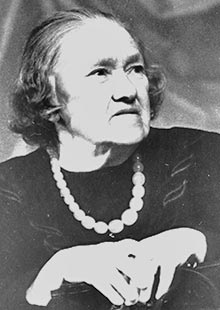
Sofiya Vasilyevna Kalistratova, also known as Sofia Kallistratova was a public defense lawyer in the Soviet Union. She defended various Soviet dissidents and from 1977 was a member of the Moscow Helsinki Group (MHG), distributing information about human rights violations in the Soviet Union.
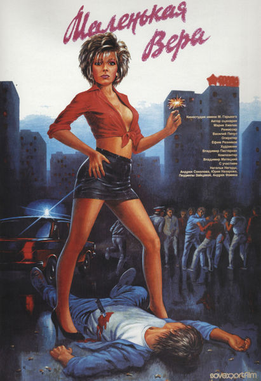
Little Vera, produced by Gorky Film Studio and released in 1988, is a film by Russian film director Vasili Pichul. The title in Russian is ambiguous and can also mean "Little Faith," symbolizing the characters' lack of hope.

Guest from the Future is a five-part Soviet children's science fiction television miniseries, made at Gorky Film Studio, first aired in 1985. It is based on the 1978 novel One Hundred Years Ahead by Kir Bulychov.

Matvei Petrovich Bronstein was a Soviet theoretical physicist, a pioneer of quantum gravity, author of works in astrophysics, semiconductors, quantum electrodynamics and cosmology, as well as of a number of books in popular science for children. He was married to Lydia Chukovskaya, a writer and human rights activist.

Purge is a novel by Finnish-Estonian writer Sofi Oksanen, which has been translated into thirty-eight languages. Oksanen's third Finnish-language novel, Purge was published in 2008 and is based upon her original play of the same name, staged at the Finnish National Theatre in 2007.
Requiem is an elegy by Anna Akhmatova about the suffering of people under the Great Purge. It was written over three decades, between 1935 and 1961. She carried it with her, redrafting, as she worked and lived in towns and cities across the Soviet Union. The set of poems was conspicuously absent from her collected works, given its explicit condemnation of the purges. The work in Russian finally appeared in book form in Munich in 1963; the whole work was not published within the USSR until 1987. It would become the best known work of poetry about Soviet Great Terror.

Sofya Vladimirovna Giatsintova was a Soviet and Russian film and theatre actress, theater director and pedagogue, who worked in the Moscow Art Theatre (1910-1937), the Lenkom Theatre, and the Moscow Stanislavsky Drama Theatre (1958-1960). Sofia Giatsintova, the People's Artist of the USSR (1955), received the Stalin Prize, as well as numerous state awards, among them the Order of Lenin. She is the author of the book of memoirs Alone With Memories.

Two Women is a 2014 Russian drama film directed by Vera Glagoleva, starring Ralph Fiennes and Sylvie Testud. It is based on Ivan Turgenev's 1872 play A Month in the Country. The film received mixed reviews from critics.
Sofia Ivanovna Sokolovskaya, also known as Yelena Kirillovna Svetlova was a Russian revolutionary, politician and senior official of the Soviet film industry until she became a victim of the Great Purge.

















